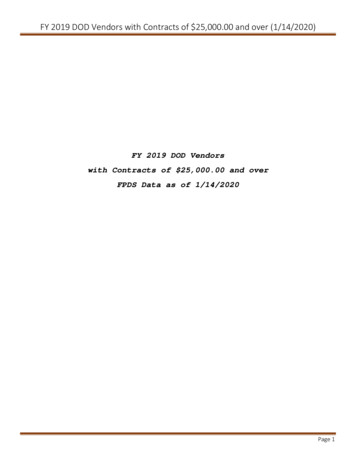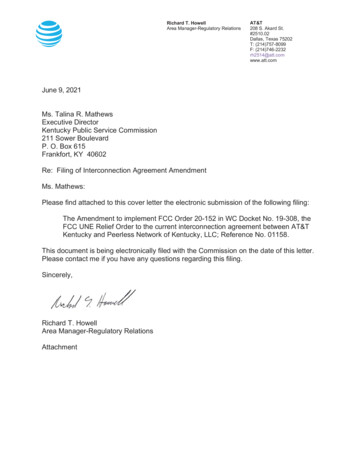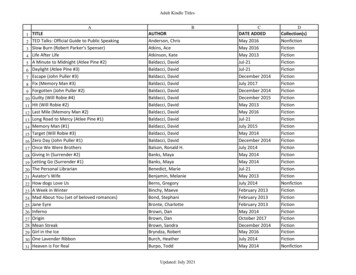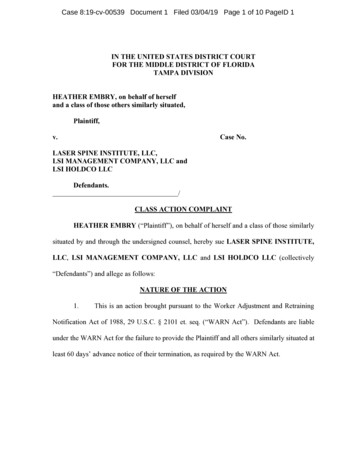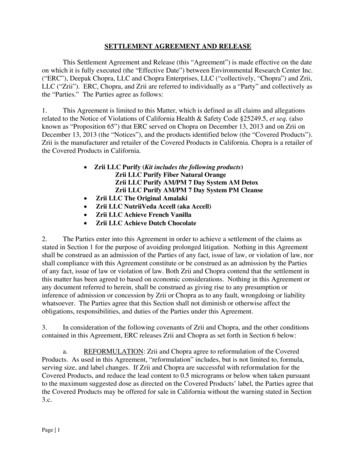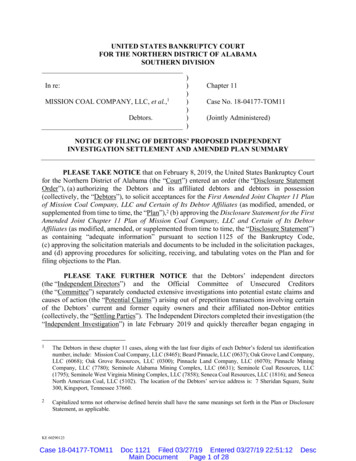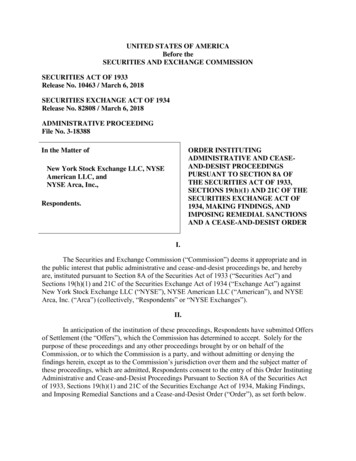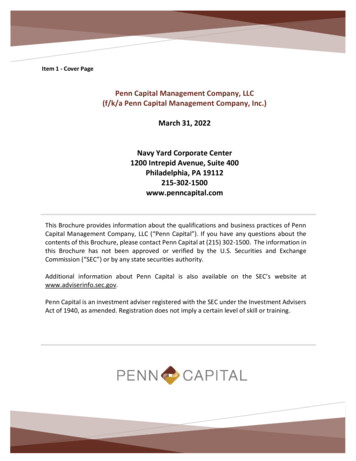
Transcription
Item 1 - Cover PageItem 1 - Cover PagePenn Capital Management Company, LLC(f/k/a Penn Capital Management Company, Inc.)March 31, 2022Navy Yard Corporate Center1200 Intrepid Avenue, Suite 400Philadelphia, PA 19112215-302-1500www.penncapital.comThis Brochure provides information about the qualifications and business practices of PennCapital Management Company, LLC (“Penn Capital”). If you have any questions about thecontents of this Brochure, please contact Penn Capital at (215) 302-1500. The information inthis Brochure has not been approved or verified by the U.S. Securities and ExchangeCommission (“SEC”) or by any state securities authority.Additional information about Penn Capital is also available on the SEC’s website atwww.adviserinfo.sec.gov.Penn Capital is an investment adviser registered with the SEC under the Investment AdvisersAct of 1940, as amended. Registration does not imply a certain level of skill or training.
Penn Capital Management Company, LLCForm ADV Part 2AItem 2 - Material Changes Since the Last Annual UpdateIn 2021, Penn Capital liquated the following two private funds:Penn Capital Short Duration Fund, LP liquidation date effective July 31, 2021Penn Capital Defensive High Yield Fund, LP, liquidation date effective December 31, 2021Penn Capital no longer markets or provides private fund investments offerings to investors.Page 2 of 36
Penn Capital Management Company, LLCForm ADV Part 2AItem 3 - Table of ContentsTable of ContentsItem 1 - Cover Page . 1Item 4 - Advisory Business . 4Item 5 - Fees and Compensation . 8Item 6 - Performance Fees & Side-by-Side Management. 9Item 7 - Types of Clients. 11Item 8 - Methods of Analysis, Investment Strategies and Risk of Loss. 11Item 9 - Disciplinary Information . 17Item 10 - Other Financial Industry Activities and Affiliations . 17Item 11 - Code of Ethics, Participation or Interest in Client Transactions, and Personal Trading . 18Item 12 - Brokerage Practices . 20Item 13 - Review of Accounts . 32Item 14 - Client Referrals and Other Compensation . 33Item 15 - Custody . 33Item 16 - Investment Discretion . 34Item 17 - Voting Client Securities. 35Item 18 - Financial Information . 36Page 3 of 36
Penn Capital Management Company, LLCForm ADV Part 2AItem 4 - Advisory BusinessPenn Capital Management Company, LLC f/k/a Penn Capital Management Company, Inc. (“Penn Capital”),became a Delaware limited liability company in December 2020 and is based in Philadelphia,Pennsylvania. Penn Capital has been an investment adviser registered with the SEC since 1988.In December 2020, Penn Capital entered into an agreement with Spouting Rock Asset Management, herebySRAM willacquire amajority membership interest in Penn Capital (the “Transaction Agreement”). Pursuant to theTransaction Agreement, SRAM will acquire an aggregate interest of Penn Capital’s investment advisorybusiness through a series of transactions commencing on March 31, 2021 resulting in a change in control.The remaining interest in Penn Capital will be held by 525 Holding. Penn Capital is principally owned andcontrolled by Spouting Rock Asset Management, LLC (“SRAM”), an SEC registered investment adviser. Theremaining membership interests are owned by 525 Holding Company, Inc., which is ultimately owned byPenn Capital employees.Since its inception, Penn Capital has followed its core belief that understanding a company’s entire capitalstructure is the best way to identify investment opportunities with the most value. In fact, the portfoliomanagers and research analysts (the “Investment Team”) have found that managing fixed incomeportfolios makes Penn Capital a better equity manager and managing equity portfolios makes Penn Capitala better fixed income manager. Integrating credit and equity research allows Penn Capital’s team toconstruct a more comprehensive mosaic and identify inefficient security pricing. This process is calledComplete Capital Structure Analysis .Penn Capital’s Complete Capital Structure Analysis is executed by the Investment Team, which iscomprised of capital structure generalists, responsible for understanding the entire capital structure ofthe companies they follow. All ideas are vetted through Penn Capital’s Investment Committees andinvestment decisions are made by senior investment professionals. Penn Capital seeks to select for itsportfolios those securities with the greatest potential to provide the risk-adjusted returns that clientsexpect.As of December 31, 2021, Penn Capital managed approximately 2.1 billion in regulatory assets undermanagement, of which approximately 1.7 billion was managed on a discretionary basis, andapproximately 252 million was managed on a non-discretionary basis.Investment Strategies:Penn Capital’s investment strategies focus on micro-to mid-capitalization equity securities, fixed incomeand high yield securities, and bank loans. The investment strategies are:Micro Cap EquitySmall to Micro Cap Equity (SMICRO)Small Cap EquitySmall Cap Value EquitySmall to Mid Cap Equity (SMID)Mid Cap EquityDefensive Floating Rate IncomeUltra-Short Duration Corporate IncomeDefensive Short Duration High IncomeDefensive High Yield Fixed IncomeOpportunistic High Yield Fixed IncomePage 4 of 36
Penn Capital Management Company, LLCForm ADV Part 2APenn Capital provides investment advisory services primarily through the following investment vehicles:registered mutual funds, private investment funds, separately managed accounts, and investmentadvisory programs offered through wrap fee programs or model portfolio distribution channels. Each ofthese is described in more detail below.Registered Mutual Funds:Penn Capital serves as a discretionary investment adviser to affiliated mutual funds registered under theInvestment Company Act of 1940, as amended (“Investment Company Act”). Penn Capital also providesnon-discretionary sub-advisory services to non-affiliated registered mutual funds. Whether acting asinvestment adviser or sub-adviser, it is Penn Capital’s responsibility to manage mutual fund investmentsin accordance with the investment strategy described in each mutual fund’s prospectus and statement ofadditional information. Penn Capital does not perform any sales, custodial, or administrative functions onbehalf of the non-affiliated mutual funds Penn Capital sub-advises.Penn Capital is the discretionary investment adviser to five mutual funds within (“funds”) within the ofPENN Capital Funds Trust (the “Trust”), an investment company registered under the InvestmentCompany Act. Penn Capital will recommend the funds as an investment option for its clients. Penn Capitalhas an incentive and inherent conflict of interest to recommend and favor the funds because the firmreceives advisory fees from the funds. These fees are described in Item 5—Fees and Compensation belowand are detailed in each fund’s prospectus. Increases in the funds’ assets will result in increases in theadvisory fees paid to Penn Capital.Private Investment Funds:Penn Capital serves as the general partner and investment adviser for a private investment fund organizedas a limited partnership. Penn Capital also serves as the sub-adviser to private funds managed byunaffiliated third parties. Penn Capital’s private investment funds are available to accredited or qualifiedinvestors, and other persons as allowable by SEC rules. The minimum size of a limited partnership interestvaries, as noted in the below chart, and Penn Capital reserves the right to waive these minimums forcertain clients.Penn Capital offers the following private investment funds:FundPenn Institutional Loan Common Master Fund, L.P.Investment Minimum 5,000,000Collective Investment Trust (“CIT”) Funds:Penn Capital serves as the investment adviser to a CIT that is available only to certain retirement plans, aspermitted under the U.S. Treasury Department’s guidance for such a group trust. The CIT’s independenttrustee manages the CIT and is responsible for CIT-related disclosures and ensuring that each participatingretirement plan’s independent plan fiduciary receives the CIT’s Offering Memorandum and executes aParticipation Agreement (including a Fee Schedule) with the trustee.Separately Managed Accounts (“SMAs”):SMAs are primarily available to: corporate retirement, pension, and profit-sharing plans; Taft-Hartleyplans; registered mutual funds; US and international pooled investment vehicles and private investmentfunds; insurance companies; charitable institutions; foundations; endowments; municipalities; banking orPage 5 of 36
Penn Capital Management Company, LLCForm ADV Part 2Athrift institutions; corporations; non-US funds; and other institutions, investment advisers, institutionalinvestors, individuals, and high net-worth individuals. Penn Capital is an approved SMA manager onvarious banking and brokerage platforms. The minimum account size for Penn Capital strategies, typically,is 250,000 equity, fixed income/bond and/or bank loan portfolios. Penn Capital reserves the right towaive the account size minimums. SMA clients have the option to negotiate individualized investmentguidelines or directives. If agreed to in advance, some SMA clients also are permitted to impose allocationand/or security-specific restrictions to either individual securities, asset classes, industries, or types ofsecurities. Certain SMA clients also can engage Penn Capital to provide non-discretionary investmentadvisory services.Wrap Fee Program Accounts:Penn Capital serves as the investment adviser to wrap fee programs that are sponsored by unaffiliatedthird parties, typically, broker-dealers (“Wrap Fee Accounts”). Wrap fee programs are advisory programsin which the underlying clients pay a single fee to the wrap fee program sponsor for access to theinvestment advisory services of multiple investment advisers such as Penn Capital. Wrap Fee Accountclients typically are high net worth individuals. The sponsors of wrap fee programs have the primaryresponsibility for the underlying clients’ servicing, communications, custody, and conduct some (or all,depending upon the program) of the trading for client accounts. Wrap Fee Account clients enter intoagreements either directly with both the sponsor and Penn Capital (“dual contract” agreements) or solelywith the wrap fee program sponsor (“single contract” agreements). Typically, underlying Wrap FeeAccount clients do not pay Penn Capital directly for investment advisory services. Instead, Penn Capitalreceives a (separately negotiated) portion of the wrap fee program sponsor’s fee for managing thoseWrap Fee Account assets that are invested in a Penn Capital investment strategy.For single contract agreements, Penn Capital makes no determination of the suitability of the sponsor’swrap fee program product for such sponsor’s underlying clients. Penn Capital is responsible only formanaging the Wrap Fee Account client’s assets in the specified investment strategy. Unless specificprogram or account restrictions are imposed, Penn Capital manages Wrap Fee Accounts in a similarmanner as Penn Capital’s other clients in the same investment strategy. On a limited basis, Penn Capitalpermits Wrap Fee Account clients and/or the wrap fee program sponsor to impose restrictions or limitson certain individual securities or types of securities. Any restrictions or limits imposed by these Wrap FeeAccount clients and/or the wrap fee program sponsors would likely affect the performance of thoseaccounts (e.g., it could be either higher or lower) than the performance received by Penn Capital’s otherclients invested in the same strategy. Also, Wrap Fee Accounts are excluded from participating in initialpublic offerings (IPOs) because securities for these accounts are purchased through either the wrap feeprogram sponsor’s or a step out broker’s desk, neither of which meet the conditions described in Item 12- Brokerage Practices under the heading IPO Allocations required for Penn Capital’s trading desk topurchase IPOs shares. To the extent that Penn Capital’s discretionary clients participate in IPOs, suchparticipation likely will result in better performance than that of the Wrap Fee Accounts that did notparticipate in the IPO.Penn Capital is not responsible for overseeing the provision of services by a wrap fee program sponsorand cannot assure the quality of such services. Wrap Fee Account clients should review all materialsrelating to their program (including the program brochure) regarding the wrap fee program sponsor’sterms, conditions and fees, and consider the advantages, disadvantages and overall appropriateness ofthe program in light of the client’s particular circumstances.Page 6 of 36
Penn Capital Management Company, LLCForm ADV Part 2AModel Delivery Accounts:Penn Capital provides non-discretionary investment advisory services to certain clients who in turn offerPenn Capital’s investment strategies to their own underlying clients (“Model Accounts”). Penn Capitalprovides model portfolios to a number of Model Accounts, including, but not limited to, unifiedmanagement account sponsors (“UMA”), SMA clients, and unaffiliated registered mutual funds. PennCapital provides its Model Account clients with a model portfolio for the applicable investment strategy,subject to negotiated fees. Penn Capital constructs the model portfolio for the applicable strategy oncethe model portfolio’s allocations, investments and weightings have been established, which typicallyoccurs at the end of each trading day. Once completed, the model portfolio is provided to Model Accountsprior to the next day’s market open unless a Model Account client requests an alternative deliveryschedule for the model portfolio (e.g., weekly, rather than daily). For Model Accounts, Penn Capitalprovides only the model portfolio, but does not assume responsibility for executing trades, performingrecordkeeping, accessing performance data, or providing underlying client reporting. Model Accountsclients, in their sole discretion, choose to act or to not act upon any or all of Penn Capital’s model portfoliorecommendations. The recommendations in the model portfolios reflect the recommendations made toPenn Capital’s discretionary accounts. Penn Capital typically delivers the model portfolios to the ModelAccounts through the various proprietary systems of each Model Account. The availability of suchproprietary systems is beyond the control of Penn Capital. To the extent such system is unavailable, PennCapital likely would be unable to deliver the model portfolio to such Model Account timely.Since Penn Capital provides Model Accounts with the relevant model portfolios prior to the next day’smarket open (or at such time as has been separately negotiated), Penn Capital will have already tradedon its recommendations during the prior trading day, which trading was used to establish the modelportfolio’s actual weightings and holdings that are then communicated to the Model Accounts prior tothe next day’s market open (or at such time as has been separately negotiated). In the instances wherethe Model Accounts choose to act upon Penn Capital’s model portfolio recommendations, Penn Capitalwill likely be trading in the same securities for its discretionary client accounts before, concurrently, orafter the Model Accounts determine to act on Penn Capital’s recommendations. In this way, and becauseof intra-day price movements, particularly with large orders or thinly traded securities, timing delays, orother operational factors associated with the implementation of trades, the trades executed by ModelAccounts could result in the Model Accounts’ underlying clients receiving prices that are materiallydifferent (i.e., at prices that are either higher or lower) than the prices obtained by Penn Capital’sdiscretionary account clients. Because it does not execute trades on behalf of Model Accounts, PennCapital cannot seek to manage through its trading strategy the market impact (including such factors asliquidity and price) of securities transactions for Model Accounts in the same way that it seeks to managemarket impact for its discretionary client accounts on whose behalf Penn Capital trades. Since ModelAccounts are unable to participate in initial public offerings (IPOs) so to the extent that Penn Capital’sdiscretionary clients participate in IPOs, such participation likely will result in better performance thanthat of the Model Accounts that did not participate in the IPO. Because Model Accounts exerciseinvestment and trading discretion, the investment performance experienced by the underlying clients ofModel Accounts could be higher or lower than the investment performance experienced by Penn Capital’sdiscretionary clients with the same or similar investment mandates.Penn Capital generally has no direct advisory relationship with any underlying clients of the ModelAccounts. Penn Capital is not responsible for the underlying client accounts as part of the investmentprograms operated by Model Accounts for which Penn Capital provides model portfolios and thereforecannot assess or guarantee the quality of those services or the investment performance experienced byPage 7 of 36
Penn Capital Management Company, LLCForm ADV Part 2Asuch underlying clients of Model Accounts. Since Penn Capital does not have investment discretion, PennCapital does not consider itself to have an advisory relationship with underlying clients of the ModelAccounts or the sponsor programs of Model Accounts. To the extent that this Brochure is delivered to theunderlying clients of Model Accounts with whom Penn Capital has no such advisory relationship, or undercircumstances where it is not legally required to be delivered, this Brochure is provided solely forinformational purposes. Furthermore, because Model Accounts either directly or through an overlaymanager generally exercise investment discretion and, in many cases, brokerage discretion, anyperformance or other information relating to Penn Capital’s services for which it exercises investmentand/or brokerage discretion should be considered to have been provided for informational purposes only,and likely would not be representative of any Model Account’s underlying clients’ results or experience.Penn Capital is not responsible for overseeing the provision by Model Accounts of brokerage or clientservices to their underlying clients and therefore Penn Capital cannot ensure the quality of such services.Underlying clients of Model Accounts should review all materials relating to their Model Account program(including the relevant program brochure or other documentation) regarding the Model Accountprogram’s terms, conditions and fees, and consider the advantages, disadvantages, and overallappropriateness of the Model Account in light of the client’s particular circumstances.Item 5 - Fees and CompensationPenn Capital investment advisory and sub-advisory clients pay fees that typically vary from client to clientdepending on the type, size, complexity of the client account, or the vehicle in which a client invests (e.g.,mutual funds, private investment funds, SMAs, wrap fee programs, Model Accounts). Fees for productsother than registered mutual funds typically are individually negotiated and generally reflect, among otherconsiderations: specific investment mandate(s), service needs, history with Penn Capital, account size,including related accounts under management, and reporting requirements. From time to time PennCapital will give certain investors in either private investment funds or SMAs more favorable economicterms than other investors in the same investment vehicle or within the same or similar investmentstrategy, including with respect to both management and performance-based fees, which terms generallytake into account certain factors, including but not limited to the timing and aggregate size of investmentswith Penn Capital of such client. Penn Capital does not require the prepayment of fees.Registered Mutual Funds:The fees payable on assets, including SMA assets, invested in the registered mutual funds of PENN CapitalFunds Trust (“Trust”) are paid by the investor in accordance with the fees and expenses identified in eachregistered mutual fund’s prospectus. Shares of the affiliated mutual funds in the Trust can be purchasedthrough various distribution channels (i.e., mutual fund supermarket platforms, and other investmentadvisers’ separate account models) that are not affiliated with Penn Capital.Investment advisory fees payable to Penn Capital by each registered mutual fund in the Trust are statedin such fund’s Prospectus.SMAs:Generally, SMA fees are calculated and paid quarterly in arrears and are prorated, if necessary, based onthe period the assets were under management, including adjustments for significant additions or partialwithdraws. Penn Capital typically invoices clients on a quarterly basis, unless otherwise negotiated by aclient.Page 8 of 36
Penn Capital Management Company, LLCForm ADV Part 2APenn Capital’s standard investment advisory fees generally range from 0.30% to 1.25% depending uponthe specific investment strategy. Fee breakpoints are also available depending upon total assets investedwith Penn Capital. Generally, fees are based upon the market value of the account at the end of eachcalendar quarter, although clients are permitted to request other arrangements. If the account usesmargin (borrowed assets), the fee is charged on the total assets.Wrap Fee Accounts, Model Accounts and Unaffiliated Registered Mutual Funds:Penn Capital does not determine the fee that investors pay to: unaffiliated registered mutual funds forwhich Penn Capital acts as sub-adviser, Model Accounts, or Wrap Fee Accounts. Penn Capital separatelynegotiates its advisory fees for its sub-advisory services provided to these products. Typically, the mutualfund investment adviser, Model Account sponsor, or wrap fee program sponsor pays Penn Capital fromthe unaffiliated mutual fund adviser’s or wrap fee program sponsor’s own management fees. Where PennCapital does not exercise investment discretion, (e.g., Model Accounts), the negotiated fee could be lowerthan those negotiated for discretionary investment advisory services, depending upon the circumstances.Underlying clients of Model Accounts or Wrap Fee Accounts should contact the sponsors of such programsdirectly for information about the investor’s total costs to participate in such programs.Other Costs and Expenses:In addition to the investment advisory fees described above, clients typically bear other costs associatedwith investments or accounts including but not limited to, and only as applicable for the client’s specificsituation: (i) custodial charges, brokerage fees, exchange fees, mutual market access fees, commissionsand related costs (see Item 12 – Brokerage Practices for more information); (ii) interest expenses; (iii)taxes, duties and other governmental charges; (iv) transfer and registration fees or other similar expenses;and (v) costs associated with foreign exchange transactions. With respect to such services (which typicallyinclude, but are not limited to, custodial, securities lending, brokerage, banking, consulting or third-partyadvisory services) SMA clients are required to establish business relationships with relevant serviceproviders or other counterparties.Registered mutual funds and private investment funds bear the fees and expenses listed above as part ofeach fund’s operating and other expenses, as well as any relevant (i) legal expenses; (ii) externalaccounting fees; and (iii) audit and tax preparation expenses.Clients also incur trading costs such as brokerage or transaction fees for services provided by entities otherthan Penn Capital, and which are not reflected in Penn Capital’s advisory fee. For more informationregarding brokerage practices and related costs, please refer to Item 12-Brokerage Practices below. On alimited basis, Penn Capital has the ability to invest in other non-affiliated pooled investment vehicles (e.g.,exchange-traded funds or closed-end investment companies). Penn Capital’s advisory fee is in additionto, and does not include the internal management, operating, or distribution fees or other expensesincurred by these other products.Item 6 - Performance Fees & Side-by-Side ManagementPenn Capital has entered into performance fee arrangements with certain qualified clients, as defined byRule 205-3 of the Investment Advisers Act of 1940, as amended (“Advisers Act”). Performance fees aresubject to individualized negotiations. Penn Capital will structure a performance or incentive feearrangement in accordance with applicable laws and related exemptions. The base fee is calculated basedPage 9 of 36
Penn Capital Management Company, LLCForm ADV Part 2Aupon the market value of the account, while the incentive fees generally are paid annually, or uponliquidation of a client’s account.Performance based fee arrangements have the potential to create an incentive to recommendinvestments that are riskier or more speculative than those that would be recommended under a differentfee arrangement. Performance based fee arrangements also have the potential to create an incentive tofavor accounts paying higher fees over other accounts in the allocation of investment opportunities. PennCapital has implemented controls to manage the inherent risks associated with incentive fees. As part ofthe Compliance Program, Penn Capital has adopted and implemented policies and procedures reasonablydesigned to prevent violation of the Advisers Act by Penn Capital or any of Penn Capital’s supervisedpersons and to ensure that investment opportunities are allocated to clients fairly and equitably. PennCapital does not consider an account’s fee structure during any part of the investment process.Investment opportunities are allocated on either a pro rata or rotation basis across the clients in eachrespective investment strategy.Side-by-side management of various types of accounts raises the possibility of favorable or preferentialtreatment of a client account or a group of accounts arising from differences in fee arrangements. PennCapital manages all client accounts in the same strategy in line with a model account for that strategy,which will generally prevent such preferential treatment. On a monthly basis, Penn Capital verifies thatall accounts in the same strategy perform similarly and will review any significant performance dispersion.Furthermore, Penn Capital has designed and implemented procedures in an effort to seek to treat allclients fairly and equitably over time. Through these procedures, Penn Capital believes that clients thatare subject to side-by-side management alongside other accounts are receiving fair and equitabletreatment over time.Penn Capital simultaneously manages multiple types of investment vehicles, including the affiliated andnon-affiliated mutual funds, private investment funds, wrap fee and model delivery programs, and SMAs,in many instances according to the same or a similar investment strategy (i.e., side-by-side management).The simultaneous management of these different investment vehicles gives rise to the types of conflictsdescribed above, as the fees for the management of certain types of investment vehicles could be higherthan for others. Nevertheless, Penn Capital has an affirmative duty to treat all clients fairly and equitablyover time.Although Penn Capital has a duty to treat all clients fairly and equitably over time, there is no requirementthat Penn Capital use the same investment practices consistently or at the same time across all clients. Inaddition, different account guidelines, applicable laws and regulations, and/or differences withinparticular investment strategies leads, in some cases, to the use of different investment practices foraccounts with a similar investment strategy or investing in the same securities. Portfolio managers knowthe size, timing and possible market impact of client trades. A conflict of interest exists where portfoliomanagers could use this information to the advantage of certain accounts they manage and to thepossible detriment of other accounts. Penn Capital will not necessarily purchase or sell the same securitiesat the same time, i
Navy Yard Corporate Center 1200 Intrepid Avenue, Suite 400 Philadelphia, PA 19112 215-302-1500 www.penncapital.com This Brochure provides information about the qualifications and business practices of Penn Capital Management Company, LLC ("Penn apital"). If you have any questions about the

